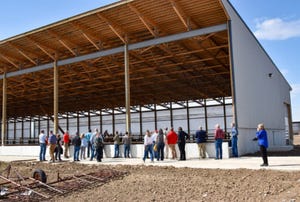NY Attorney General sues JBS for misleading consumers about products
Lawsuit claims company has misrepresented its environmental claims.
February 29, 2024

New York Attorney General Letitia James filed a lawsuit this week against JBS USA Food Company and JBS USA Food Company Holdings (JBS USA) alleging the company misled the public about its environmental impact. According to the press release, James said JBS USA has claimed that it will achieve net zero greenhouse gas (GHG) emissions by 2040 even as it has documented plans to increase production, which would increase its carbon footprint.
James referenced that beef production accounts for 14.5% of annual global greenhouse gas emissions. USDA, however, noted in 2023 that the life cycle annual GHG emission related to beef production and consumption in the U.S. is about 3.7% of the total national GHG emission inventory.
In 2021, the JBS Group reported total global greenhouse gas emissions of over 71 million tons, which James said is more than the total emissions of some countries. She seeks to stop JBS USA from continuing these false and misleading marketing practices, pay "disgorgement of all ill-gotten profits,” and penalties.
“As families continue to face the daily impacts of the climate crisis, they are willing to spend more of their hard-earned money on products from brands that are better for the environment,” said Attorney General James. “When companies falsely advertise their commitment to sustainability, they are misleading consumers and endangering our planet. JBS USA’s greenwashing exploits the pocketbooks of everyday Americans and the promise of a healthy planet for future generations. My office will always ensure that companies do not abuse the environment and the trust of hardworking consumers for profit.”
James further suggested that JBS Group and JBS USA has not calculated the company’s total greenhouse gas emissions, and therefore had no way of knowing whether they could successfully reduce those emissions to net zero by 2040. She alleges that JBS Group’s greenhouse gas emissions calculations have not accounted for emissions resulting from deforestation in the Amazon.
James claims that the companies’ actions constitute “deceptive business practices and false advertising” in violation of sections 349 and 350 of the General Business Law. JBS USA’s insistence on continuing to tout “Net Zero by 2040” despite knowing the claim was fraudulent also constitutes a violation of Executive Law 63(12), she claims.
With this lawsuit, Attorney General James is asking the court to require JBS USA to cease its “Net Zero by 2040” advertising campaign, conduct a third-party audit of its compliance with New York’s consumer protection statutes, and pay disgorgement of all ill-gotten gains earned by misleading the public about their business practices as well as penalties of at least $5,000 per violation. The total number of violations will be determined at trial.
“As the fight against climate change presses on around the world, it is heartening to know that many corporate entities are working to reduce their carbon footprint and greenhouse gas emissions,” said N.Y. Senator Pete Harckham, chair of the committee on environmental conservation. “Deceiving consumers in this regard is doubly shameful because, falsehoods aside, major efforts along these lines are truly needed. I thank Attorney General James for recognizing there can be no grey areas in greenwashing claims and climate action.”
In a statement to Feedstuffs, JBS said it disagrees with the actions of the attorney general and that it takes its commitment to a more sustainable future for agriculture “very seriously.”
“JBS will continue to partner with farmers, ranchers and our food system partners around the world to help feed a growing population while using fewer resources and reducing agriculture’s environmental impact. Our belief that American agriculture can help sustainably feed the world is undeterred,” the company added.
You May Also Like



